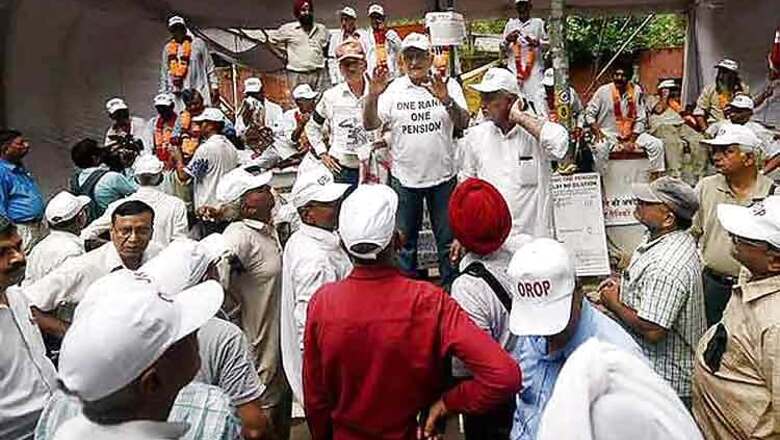
views
Facing an apathetic bureaucracy and a self serving political system, hundreds of defence veterans and war widows are out on the streets to build pressure on the Narendra Modi government for the early implementation of the One Rank One Pension scheme. Since June 12, the veterans including many war heroes and highly decorated former defence personnel, their families and even some youngsters are peacefully protesting at Jantar Mantar for their right and pride.
The One Rank One Pension system means a retired soldier of the same rank and same length of service will get the same pension regardless of when the person retires.
"It is not about money but it is our right. The government must give it. Now, it has become a fight for our pride. If the government says it has no money for us, we will stop our protest," said Chairman of Indian Ex-servicemen Movement Major General (retired) Satbir Singh, one of the leaders of the agitation.
It was during former Indira Gandhi's tenure (1966-1977) that major changes were made in the pension scheme of the soldiers and those in the lower ranks of defence forces were affected the most. The Third Pay Commission, which came into effect from November 1, 1973, decided that a soldier from the rank of Sipahi to Subedar Major will get 50% of his salary as pension vis-a-vis 70% that was given earlier but with a condition that he has to complete 33 years in service.
But the irony is that to ensure the youthful profile of defence forces a jawan can be in service only till the age of 35-37 years and so he cannot fulfil the given condition and gets lesser pension. Moreover, the 20% of his due was given to the civilian employees who never ever undergo the hardships that a soldier faces during his career.
But the Third Pay Commission did not affect the pension of officers and hence they never raised any objection. "It was Colonel Inderjeet Singh who raised his voice in 1982 for the implementation of One Rank One Pension," said Naik Subedar (retired) Gurucharan Singh Sidhu, General Secretary of Armed Forces Veterans Association of India.
The government has already made it clear that the scheme will be implemented with effect from April 1, 2014 but it is yet to see the light of day. The total amount for implementing OROP stands at Rs 8,252 crore and will benefit around 25 to 27 lakh war veterans and 6 lakh widows.
"I do not understand where the confusion is. Everything is clear - Parliament has passed it twice, the Supreme Court has asked to implement it. The Defence Ministry has cleared it and the Finance Ministry has to provide the fund now. It is the bureaucracy which is a major roadblock," said Naik Subedar (retired) Sidhu.
If a soldier dies, the beneficiary of his pension will only be his wife, his daughter until she's married or his differently-abled child.
"Our fight is majorly for war widows and lower ranks who suffer the most," said Colonel (retired) Pushpender Singh, who is sitting on fast-unto-death since August 16.
As the scheme will come into effect from April 1, 2014, veterans will not get arrears from when they retired and only their pension will be equal to that of a soldier retiring today holding same rank and having put in same years in service. They will get their dues for last one-half-years.
A proposal was also made to the government to give cash to war widows and soldiers upto the rank of Subedar Major immediately and the rest can be given bonds for one-two years. But it is to be seen whether government will accept their proposal or come up with a fresh one.



















Comments
0 comment